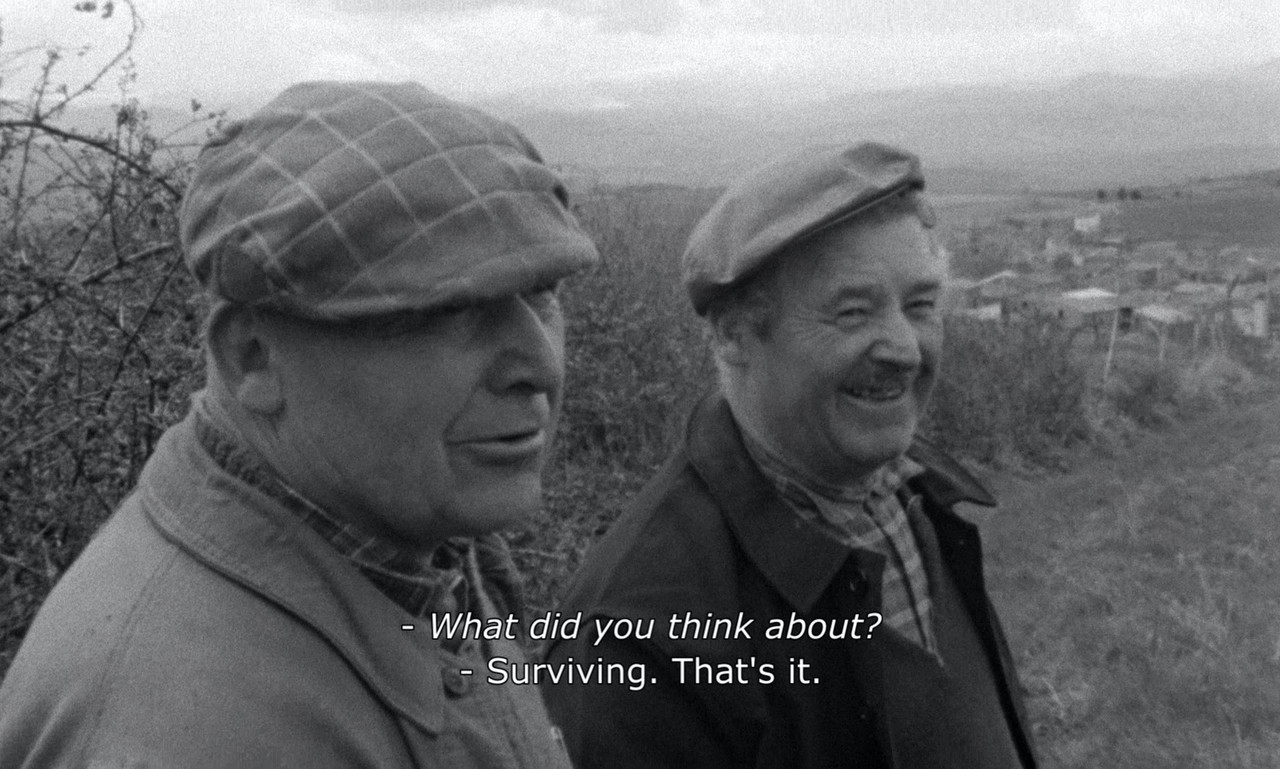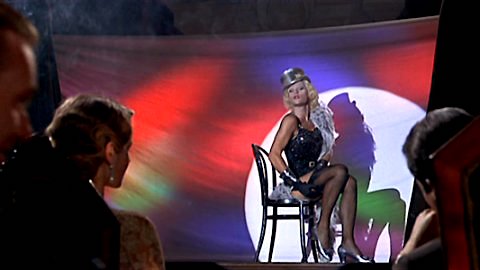“One thing I find appalling is when people who were [Vichy President] Pétain supporters come up to me and tell me what they did for the Resistance. Sometimes it's unreal. “Oh, Mr. Gaspard, if only you knew what we did, what I did for the Resistance.” Go ahead, pal, tell me all about it. I try to stay calm. I'm a salesman, and I want to sell my product. The company doesn't pay me to do politics and pick fights, so sometimes I find myself obliged to listen to a song and dance of some guy who shows me a drawer and gets his wife to confirm that there was indeed a revolver in that drawer during the war, a revolver which he was supposedly ready to use on the Germans. Only he never actually used it. History doesn't lie.” Le chagrin et la pitié [The Sorrow and the Pity] (Marcel Ophüls, 1969)
Jun
5
Sorry I Was on a Boat Day

Two smiling farmers. The interviewer asks “What did you think about?” One of them replies “Surviving. That's it.” Screenshot via. DPs: André Gazut & Jürgen Thieme.
Someone makes an excuse on Sorry I Was on a Boat Day (USA)
– Émile Coulaudon aka Colonel Gaspard, former head of the French Resistance in Auvergne
Marcel Ophüls documents the people of Clermont-Ferrand as the microcosm of Vichy France, part of Europe's only country that happily collaborated with its occupier, Nazi Germany. What were their justifications, their excuses, their motivations? Was it survival, habit, greed? Comfort, conformity, obedience, fear?
And what is yours?
nazis
“You must realize that today in Germany anything can happen, even the improbable, and it's just the beginning, Frederick. Personal morals are dead. We are an elite society where everything is permissible. These are Hitler's words. My dear Frederick, even you should give them some thought.”La caduta degli dei (Götterdämmerung) [The Damned] (Luchino Visconti, 1969)
May
18
Visit Your Relatives Day

Martin Von Essenbeck (Helmut Berger) entertains the family. DPs: Pasqualino De Santis & Armando Nannuzzi.
A family gathering on Visit Your Relatives Day (USA)
– Aschenbach
The wealthy Von Essenbecks gather for a family dinner party. There is entertainment.
“Where rats turn up, they spread diseases and carry extermination into the land. They are cunning, cowardly and cruel, they travel in large packs, exactly the way the Jews infect the races of the world.”Der ewige Jude [The Eternal Jew] (Fritz Hippler, 1940)
Apr
4
World Rat Day

Nazi propaganda postcard advertising an exhibition in the library of the Deutsche Museum in Munich called Der ewige Jude: Große politische Schau (“The Eternal Jew: Great Political Exhibition”). The front of the card is a reproduction of the film poster. The card is dated 1937, which is at odds with the information in this blogpost. DPs: A. Endrejat, Anton Haffner, R. Hartmann, F.C. Heeve, Heinz Kluth, Erich Stoll & H. Winterfeld.
I took a long time considering what to nominate for today's topic. This is not an easy one. And frankly, barely qualifies as as film.
In the 1930s, three films (2 British, 1 American) portrayed Jews in a positive light, as victims of persecution through history. When in 1938 the Novemberpogrome took place in (Nazi-occupied) Germany (the term “Kristallnacht” is a horrible euphemism and I won't use it), media was not unanimously jubilant about it. Understanding that violence is not the way to popular consensus, plans were made to change people's thinking about the Jews, using widely available visual media.
In 1939, the faux #documentary Der ewige Jude, directed by the leader of Goebbels' #propaganda film department Fritz Hippler, started production. Scenes shot in Jewish ghettos in occupied Poland were intercut with real, but out-of-context documentary footage, giving it a false sense of authenticity./
– narrator
A recurring theme in Der ewige Jude is disease. Not merely to suggest “the Jew”'s unclean life and religion, but as a synonym of people as a vermin, a parasite to decent (read: Aryan) society. In a chilling demonstration of the Kuleshov Effect, footage of a large group of #rats coming out of a sewer is followed by a crowd of Jews in the Łódź Ghetto, filmed without their consent or knowledge of where this footage would end up.